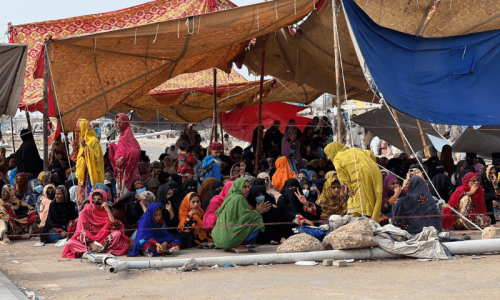Some of the old faces in the previous Balochistan Assembly have been punished soundly by the provincial electorate for their inability to handle worsening law and order, poor governance and rampant corruption.
Pakistan Peoples Party (PPP), the former ruling party, was unable to win a single seat in Balochistan. Its coalition partner, Balochistan National Party-Awami (BNP-A) could only win two.
On the other hand, some other old faces are as present as ever. Their tribal patronage helped them win, with many voters having no other choice for a lack of other candidates. Out of 51 general assembly seats, the influential tribesmen managed to secure 13 seats. They represent parties across the political spectrum – but at the same time, take away from middle class Baloch representation. The Jamiat Ulema-e-Islam-Fazl (JUI-F), which was also part of the previous cabinet, managed to fare relatively well.
So the recently-elected coalition is a mixture of the old and the new. What remains to be seen is how it’s going to tackle the host of issues facing Balochistan. Growing sectarianism, the insurgency, and the increasing radicalisation of society pose serious threats to the future coalition government in Balochistan. People have high expectations, which are somewhat justified – the people voted for mainstream nationalist parties to bring an end to unrest in the province.
What the provincial government needs to do
As promised by the Baloch nationalist party, the National Party (NP), an independent commission must be formed to probe the issue of missing persons and the recovery of mutilated dead bodies in different parts of Balochistan. Similarly, ruthless accountability should be conducted for the recovery of national wealth. Whether it’s from politicians or bureaucrats, nobody should be spared in terms of accountability. Peoples’ lost confidence in state institutions needs to be restored.
In addition, the provincial government must ensure that all secret services, and the Frontier Corps, operate under the legal framework and Constitution of Pakistan. The chief executive of the province must maintain daily contact with all deputy commissioners of the province to ensure that human rights are not violated.
While the formation of the coalition government by three political parties – the NP, the Pakhtunkhwa Milli Awami Party (PkMAP) and the Pakistan Muslim League-Nawaz (PML-N) – so far seems to be a good omen for the people of the province, although BNP-Mengal’s strong allegations of rigging in the elections raise concerns. But the alliance is also a test case, especially for the NP and PkMAP to translate their commitments into action.
While the next five years are considered crucial for Pakistan’s future, they are also crucial for Balochistan in particular. The new Balochistan government will be bracing itself for some important decisions. The Gwadar Deep Sea Port is supposed to become operational and the Iran-Pakistan gas pipeline is to be constructed during this administration’s tenure. The new government will be taking a decision to either hand over the copper-gold project of Rekodiq to a foreign company or to run it by the provincial government. The Nawab Raisani-led cabinet had decided to run the project through the provincial government.
In addition, an important and highly sensitive census will be conducted by the incoming government of Balochistan – which will also have to take into consideration the issue of service delivery and development funds.
Will the rule of law be a priority for the government? Will representation cut across the class divide? Will missing people be recovered? Will targeted killings and mutilated bodies turning up end? These are the underlying questions, which need to be addressed by the incoming government.
The challenges are tough. The timing is crucial. It is now up to the PML-N and Balochistan’s nationalist political parties to bring back peace to the province.
The writer is a Quetta-based journalist working as Bureau Chief for DawnNews and can be reached at ali.shah@dawnnews.tv













































